may 25, 2020 I'm writing a lot of stuffs and I haven't finished one!!!
Don't wanna be here? Send us removal request.
Text
idc about the ending anymore. it's disappointing and I'm sure the author is unsatisfied too. author didn't just draw all those intimacy just to feed it to karam who isn't even that fleshed out. anyway, I'm JUNSEO and JISOO now. whatever y'all think.
IMAGINE THIS IS THEM BECAUSE IM PLANNING TO MAKE IT THEM OK. it's been 6 years since this manwha is published but I just read it today and kept tossing on my bed because it's so JSIDIFJFBSNA



#unripe expression#im making a story ok#for junseo and jisoo to have explain what the hell happened#i hope i finish it though lol
1 note
·
View note
Photo


yesterday, you said you would love me.
today, you have already forgotten
14K notes
·
View notes
Text
I have been working on a story since yesterday and since I wrote it on the fly like during 1AM when I'm supposedly sleeping already. I managed to write my ideas into almost 4k words in the first chapter and wrote half in the 2nd chapter. It's making me cry now that I'm finishing the 2nd chapter (later in the day) because of the inconsistency in the plot throughout 1 & 2! like I originally had an idea of what would happen but I didn't know how to execute it so the narrative got a bit weird. in the end while writing ch2 I managed to connect all the story and motives for CH 1 & 2 which is making me cry because I literally have to change a lot of narratives and dialogues😭😭 I haven't read the story yet, I hate reading and revising it😭😭
0 notes
Text
How I learned to write smarter, not harder
(aka, how to write when you're hella ADHD lol)
A reader commented on my current long fic asking how I write so well. I replied with an essay of my honestly pretty non-standard writing advice (that they probably didn't actually want lol) Now I'm gonna share it with you guys and hopefully there's a few of you out there who will benefit from my past mistakes and find some useful advice in here. XD Since I started doing this stuff, which are all pretty easy changes to absorb into your process if you want to try them, I now almost never get writer's block.
The text of the original reply is indented, and I've added some additional commentary to expand upon and clarify some of the concepts.
As for writing well, I usually attribute it to the fact that I spent roughly four years in my late teens/early 20s writing text roleplay with a friend for hours every single day. Aside from the constant practice that provided, having a live audience immediately reacting to everything I wrote made me think a lot about how to make as many sentences as possible have maximum impact so that I could get that kind of fun reaction. (Which is another reason why comments like yours are so valuable to fanfic writers! <3) The other factors that have improved my writing are thus: 1. Writing nonlinearly. I used to write a whole story in order, from the first sentence onward. If there was a part I was excited to write, I slogged through everything to get there, thinking that it would be my reward once I finished everything that led up to that. It never worked. XD It was miserable. By the time I got to the part I wanted to write, I had beaten the scene to death in my head imagining all the ways I could write it, and it a) no longer interested me and b) could not live up to my expectations because I couldn't remember all my ideas I'd had for writing it. The scene came out mediocre and so did everything leading up to it. Since then, I learned through working on VN writing (I co-own a game studio and we have some visual novels that I write for) that I don't have to write linearly. If I'm inspired to write a scene, I just write it immediately. It usually comes out pretty good even in a first draft! But then I also have it for if I get more ideas for that scene later, and I can just edit them in. The scenes come out MUCH stronger because of this. And you know what else I discovered? Those scenes I slogged through before weren't scenes I had no inspiration for, I just didn't have any inspiration for them in that moment! I can't tell you how many times there was a scene I had no interest in writing, and then a week later I'd get struck by the perfect inspiration for it! Those are scenes I would have done a very mediocre job on, and now they can be some of the most powerful scenes because I gave them time to marinate. Inspiration isn't always linear, so writing doesn't have to be either!
Some people are the type that joyfully write linearly. I have a friend like this--she picks up the characters and just continues playing out the next scene. Her story progresses through the entire day-by-day lives of the characters; it never timeskips more than a few hours. She started writing and posting just eight months ago, she's about an eighth of the way through her planned fic timeline, and the content she has so far posted to AO3 for it is already 450,000 words long. But most of us are normal humans. We're not, for the most part, wired to create linearly. We consume linearly, we experience linearly, so we assume we must also create linearly. But actually, a lot of us really suffer from trying to force ourselves to create this way, and we might not even realize it. If you're the kind of person who thinks you need to carrot-on-a-stick yourself into writing by saving the fun part for when you finally write everything that happens before it: Stop. You're probably not a linear writer. You're making yourself suffer for no reason and your writing is probably suffering for it. At least give nonlinear writing a try before you assume you can't write if you're not baiting or forcing yourself into it!! Remember: Writing is fun. You do this because it's fun, because it's your hobby. If you're miserable 80% of the time you're doing it, you're probably doing it wrong!
2. Rereading my own work. I used to hate reading my own work. I wouldn't even edit it usually. I would write it and slap it online and try not to look at it again. XD Writing nonlinearly forced me to start rereading because I needed to make sure scenes connected together naturally and it also made it easier to get into the headspace of the story to keep writing and fill in the blanks and get new inspiration. Doing this built the editing process into my writing process--I would read a scene to get back in the headspace, dislike what I had written, and just clean it up on the fly. I still never ever sit down to 'edit' my work. I just reread it to prep for writing and it ends up editing itself. Many many scenes in this fic I have read probably a dozen times or more! (And now, I can actually reread my own work for enjoyment!) Another thing I found from doing this that it became easy to see patterns and themes in my work and strengthen them. Foreshadowing became easy. Setting up for jokes or plot points became easy. I didn't have to plan out my story in advance or write an outline, because the scenes themselves because a sort of living outline on their own. (Yes, despite all the foreshadowing and recurring thematic elements and secret hidden meanings sprinkled throughout this story, it actually never had an outline or a plan for any of that. It's all a natural byproduct of writing nonlinearly and rereading.)
Unpopular writing opinion time: You don't need to make a detailed outline.
Some people thrive on having an outline and planning out every detail before they sit down to write. But I know for a lot of us, we don't know how to write an outline or how to use it once we've written it. The idea of making one is daunting, and the advice that it's the only way to write or beat writer's block is demoralizing. So let me explain how I approach "outlining" which isn't really outlining at all.
I write in a Notion table, where every scene is a separate table entry and the scene is written in the page inside that entry. I do this because it makes writing nonlinearly VASTLY more intuitive and straightforward than writing in a single document. (If you're familiar with Notion, this probably makes perfect sense to you. If you're not, imagine something a little like a more contained Google Sheets, but every row has a title cell that opens into a unique Google Doc when you click on it. And it's not as slow and clunky as the Google suite lol) When I sit down to begin a new fic idea, I make a quick entry in the table for every scene I already know I'll want or need, with the entries titled with a couple words or a sentence that describes what will be in that scene so I'll remember it later. Basically, it's the most absolute bare-bones skeleton of what I vaguely know will probably happen in the story.
Then I start writing, wherever I want in the list. As I write, ideas for new scenes and new connections and themes will emerge over time, and I'll just slot them in between the original entries wherever they naturally fit, rearranging as necessary, so that I won't forget about them later when I'm ready to write them. As an example, my current long fic started with a list of roughly 35 scenes that I knew I wanted or needed, for a fic that will probably be around 100k words (which I didn't know at the time haha). As of this writing, it has expanded to 129 scenes. And since I write them directly in the page entries for the table, the fic is actually its own outline, without any additional effort on my part. As I said in the comment reply--a living outline!
This also made it easier to let go of the notion that I had to write something exactly right the first time. (People always say you should do this, but how many of us do? It's harder than it sounds! I didn't want to commit to editing later! I didn't want to reread my work! XD) I know I'm going to edit it naturally anyway, so I can feel okay giving myself permission to just write it approximately right and I can fix it later. And what I found from that was that sometimes what I believed was kind of meh when I wrote it was actually totally fine when I read it later! Sometimes the internal critic is actually wrong. 3. Marinating in the headspace of the story. For the first two months I worked on [fic], I did not consume any media other than [fandom the fic is in]. I didn't watch, read, or play anything else. Not even mobile games. (And there wasn't really much fan content for [fandom] to consume either. Still isn't, really. XD) This basically forced me to treat writing my story as my only source of entertainment, and kept me from getting distracted or inspired to write other ideas and abandon this one.
As an aside, I don't think this is a necessary step for writing, but if you really want to be productive in a short burst, I do highly recommend going on a media consumption hiatus. Not forever, obviously! Consuming media is a valuable tool for new inspiration, and reading other's work (both good and bad, as long as you think critically to identify the differences!) is an invaluable resource for improving your writing.
When I write, I usually lay down, close my eyes, and play the scene I'm interested in writing in my head. I even take a ten-minute nap now and then during this process. (I find being in a state of partial drowsiness, but not outright sleepiness, makes writing easier and better. Sleep helps the brain process and make connections!) Then I roll over to the laptop next to me and type up whatever I felt like worked for the scene. This may mean I write half a sentence at a time between intervals of closed-eye-time XD
People always say if you're stuck, you need to outline.
What they actually mean by that (whether they realize it or not) is that if you're stuck, you need to brainstorm. You need to marinate. You don't need to plan what you're doing, you just need to give yourself time to think about it!
What's another framing for brainstorming for your fic? Fantasizing about it! Planning is work, but fantasizing isn't.
You're already fantasizing about it, right? That's why you're writing it. Just direct that effort toward the scenes you're trying to write next! Close your eyes, lay back, and fantasize what the characters do and how they react.
And then quickly note down your inspirations so you don't forget, haha.
And if a scene is so boring to you that even fantasizing about it sucks--it's probably a bad scene.
If it's boring to write, it's going to be boring to read. Ask yourself why you wanted that scene. Is it even necessary? Can you cut it? Can you replace it with a different scene that serves the same purpose but approaches the problem from a different angle? If you can't remove the troublesome scene, what can you change about it that would make it interesting or exciting for you to write?
And I can't write sitting up to save my damn life. It's like my brain just stops working if I have to sit in a chair and stare at a computer screen. I need to be able to lie down, even if I don't use it! Talking walks and swinging in a hammock are also fantastic places to get scene ideas worked out, because the rhythmic motion also helps our brain process. It's just a little harder to work on a laptop in those scenarios. XD
In conclusion: Writing nonlinearly is an amazing tool for kicking writer's block to the curb. There's almost always some scene you'll want to write. If there isn't, you need to re-read or marinate.
Or you need to use the bathroom, eat something, or sleep. XD Seriously, if you're that stuck, assess your current physical condition. You might just be unable to focus because you're uncomfortable and you haven't realized it yet.
Anyway! I hope that was helpful, or at least interesting! XD Sorry again for the text wall. (I think this is the longest comment reply I've ever written!)
And same to you guys on tumblr--I hope this was helpful or at least interesting. XD Reblogs appreciated if so! (Maybe it'll help someone else!)
32K notes
·
View notes
Text
Writing Tips Master Post
Character writing/development:
Character Arcs
Making Character Profiles
Character Development
Comic Relief Arc
Internal Conflict
Character Voices
Creating Distinct Characters
Suicidal Urges/Martyr Complex
Creating Likeable Characters
Writing Strong Female Characters
Writing POC Characters
Building Tension
Plot devices/development:
Intrigue in Storytelling
Enemies to Lovers
Alternatives to Killing Characters
Worldbuilding
Misdirection
Consider Before Killing Characters
Foreshadowing
Narrative:
Emphasising the Stakes
Avoid Info-Dumping
Writing Without Dialogue
1st vs. 2nd vs. 3rd Perspective
Fight Scenes (+ More)
Transitions
Pacing
Writing Prologues
Dialogue Tips
Writing War
Writing Cheating
Worldbuilding:
Worldbuilding: Questions to Consider
Creating Laws/Rules in Fantasy Worlds
Book writing:
Connected vs. Stand-Alone Series
A & B Stories
Writer resources:
Writing YouTube Channels, Podcasts, & Blogs
Online Writing Resources
Outlining/Writing/Editing Software
Writer help:
Losing Passion/Burnout
Overcoming Writer's Block
Fantasy terms:
How To Name Fantasy Races (Step-by-Step)
Naming Elemental Races
Naming Fire-Related Races
How To Name Fantasy Places
Ask games:
Character Ask Game #1
Character Ask Game #2
Character Ask Game #3
Miscellaneous:
1000 Follower Post
2000 Follower Poll
Writing Fantasy
32K notes
·
View notes
Text

Saint Ceri - upcoming adult otome
Saint Ceri is an adult otome with poly options that will be released on July 31st!
It features three love interests, 6 monogamous endings, and every possible combination of poly endings! But reaching your happy endings will require careful communication and withstanding the pressure of the church you belong to.
It also features:
📖 120k words
🎨 28 total base CGs
🌹 Soft femdom (two submissive male LIs, one dominant female LI)
💋 NSFW scenes, and an optional SFW mode
💔 Optional jealousy and angst; break everyone’s heart!
Play the demo now on itch.io or Steam!
249 notes
·
View notes
Text
Write more Deaf characters!
[Large Text: Write more Deaf characters!]
When answering questions about deaf and hard of hearing characters, I have noticed they are overwhelmingly about:
A character who is deaf in one ear or hard of hearing because of an accident
A character who was born deaf and knows sign language, but seems to have 0 connection to the broader Deaf community
This is not the experience of most d/Deaf people! So, here's your primer to Deaf community and culture, and writing a Deaf character, because they are sorely underrepresented.
(Disclaimer: this post was written using viewpoints I, a singular Deaf person in the United States, have encountered. I tried to make this as general as possible to encompass many Deaf views, but it is possible that I have misconstrued something. Do not take this guide as the be-all and end-all of your knowledge on Deaf culture. Keep reading and researching the Deaf community, and explore viewpoints from many different Deaf people of all backgrounds.)
Why do you write Deaf with capital D?
[Large Text: Why do you write Deaf with capital D?]
The term "deaf" with the lowercase d means not being able to hear. The term "Deaf" with an uppercase D refers to the cultural identity formed by deaf people. This identity is difficult to explain but it includes knowing sign language and engaging with other Deaf people.
There are varying opinions within the Deaf community on who is allowed to call themselves culturally Deaf. Some Deaf believe that only those who were born into the Deaf community (whose family is Deaf, who attended a Deaf school, and/or who have sign language as a first language) are allowed to consider themselves culturally Deaf. On the 'flip' side, some Deaf believe that anyone with hearing loss can claim the label. And of course, you can find someone Deaf with any opinion in between.
This is all intracommunity nuance. If your character is born deaf and learns sign language at a young age or as a first language, they are likely culturally Deaf.
Sign Language Use
[Large Text: Sign Language Use]
Sign languages are the language of Deaf communities. (Note that there are many sign languages in different regions, and they are not related in the same way spoken languages are!)
Most sign languages did not originate alongside spoken language, either, so they usually have different grammar than the spoken language in a region. This means that someone whose first language is sign may have difficulty learning even the written version of the spoken language due to the different grammar and translation. For native signers, the spoken language of their area is their second language.
Sign languages are fully developed languages, with grammar and structure. Sign language is not "less" than spoken language, and encouraging sign language does not discourage speech. (Even if it did, that's not a bad thing! Sign languages are still a valid and rich communication form!) Sign languages have slang and expressions/idioms too.
Sign languages typically have a "manual alphabet" otherwise known as "fingerspelling". This is a way to represent words that don't have a sign. Fluent signers very rarely fingerspell; normally fingerspelling is for proper nouns which don't have a name sign.
Name signs are the last big point I want to cover about sign language. A name sign is a way to refer to someone so you don't have to spell their name every time. It's usually related to someone's attributes, like dimples or a specific way of moving. Sign names can only be given by Deaf people who are fluent in sign language.
Deaf Education
[Large Text: Deaf Education]
For a long time, deaf people were considered unable to learn, just because they couldn't hear. And since 1880, for about 100 years and even still today, the prevailing tradition in deaf education was/is oralism--a teaching method based on speech that rejects sign language.
Historically speaking, if deaf children were to receive an education, they would be sent to a Deaf residential school. These still exist, although there are also many Deaf schools that are typical day schools, just for d/Deaf/hoh students.
Deaf children may also attend "mainstream" schools; they might have sign language interpreters and other accessibility accommodations, or they may be forced to rely on lipreading and context, or placed in special education where their needs often still are not met.
Oralism still has lasting effects today. Deaf people have received, and still do receive, worse education than hearing people.
One common problem is language deprivation. Many deaf children grow up without access to sign language. About 90% of deaf people are born to hearing parents; even if hearing parents do send their deaf kids to a Deaf school, they may not learn sign language themselves, so the child must rely on what they can gather of spoken language at home. Sign language is even discouraged by some audiologists and speech professionals, because it "might interfere with speech". But by depriving deaf children of sign language, more often than not, they are being deprived of all language.
People who are born deaf do not learn spoken language naturally, even when provided with aids like hearing aids and cochlear implants. Many deaf kids who learn speech learn it through extensive speech therapy, and often have a "deaf accent" from copying mouth shapes but not being able to hear or process what sounds they are making, which may also include having an atypically pitched voice (e.g., very high-pitched). Lip-reading is inaccurate and the best lip-readers can only follow about 30% of a conversation, and that's by intently watching with no breaks.
It is possible to learn a language at any age. But it is easiest to pick up a new language when one is young. Children who do not learn a first language by around age 5--the age at which they would start school--have more difficulty learning any language, and may have frequent outbursts or trouble expressing emotions as a result of communication difficulties.
Another problem, especially within the Deaf community, is literacy. Spoken languages are often unrelated to the signed language of the same region. Learning to read and write, as a Deaf child, is like learning a whole new separate language, with different grammar and structure than their native language. This is why captions are not a perfect accessibility tool--it is, for many Deaf people, being offered an alternative in their second language, if they have learned to read and write at all.
Deaf Culture Norms
[Large Text: Deaf Culture Norms]
To hearing people, Deaf conversation can seem very blunt and to the point. This isn't to say Deaf people are inexpressive--quite the opposite: sign languages often use facial expressions as part of the grammar, and there is a lot of expression that can be incorporated into a sign--but there isn't a lot of "talking around" things. You can see part of this culture in name signs, which are usually based off a trait of the person. It's not offensive--it's just how they're recognized!
Another conception is of Deaf people being over expressive, but again, that is just part of sign language grammar. Face and body movements take the place of tone of voice, as well as other grammatical clarifications.
Deaf people talk a lot! It's very hard to end a conversation, because there will always be something else to say or a new person to meet. Hugging and other physical touch are really common greetings.
Tapping people on the shoulder to get their attention is fine. Other ways include flicking the lights or rattling a surface (for vibrations). Eye contact while signing is also important to make known that you are listening. Groups of Deaf people will sit in a circle so everyone can see everyone else. It's rude to talk in a Deaf space. If you are lost in the conversation, you'd ask if you can write or type instead.
Deaf Space also refers to design concepts that are more accessible to deaf people. This includes good lighting, minimal signing-height visual obstacles (e.g., low waist-height shelves), visual indicators instead of bells, open spaces so people can sit in a circle to talk, and automatic doors and wide hallways/passages so it is easier to continue a conversation while walking.
It's also very rude to comment on a Deaf person's voice. Do not mention you're surprised they can speak. Do not call their accent "cute" or "weird" or anything like that. Do not ask them to speak. Do not say their voice sounds really good ("for a deaf person") or that you wouldn't be able to tell they are deaf.
Deaf Views on Deafness
[Large Text: Deaf Views on Deafness]
The Deaf community is incredibly proud of their Deafness. You'll often hear the phrases "hearing loss = deaf gain" or "failing a hearing test" as "passing the deaf test". Continuing the Deaf community and culture is highly valued, and learning sign language is encouraged for everyone.
Many people in the Deaf community dislike cochlear implants as their success is incredibly variable and they require invasive surgery and therapies from a young age. Another big argument against CI is that they are often presented as the only or the first option to hearing parents, who misunderstand CI as a "cure" and then do not give their child access to sign language.
Deaf people also reject any sort of cure for deafness, especially genetic therapies. Many Deaf people do not think of their Deafness as a disability.
(Deaf people will often point out the advantages of Deaf culture and sign language, such as being able to talk over long distances, through windows, and even underwater.)
Most hard of hearing and some deaf people have hearing aids, although it is really an individual choice whether or not to wear them. Many d/Deaf/hoh people are overwhelmed and startled very easily by noise (since they're not used to that much auditory input) and get tinnitus from auditory overstimulation. They may also struggle with auditory processing--locating sounds, interpreting sounds, recognizing and interpreting speech, and other issues.
The Deaf community doesn't have any general complaints about hearing aids, just many prefer not to wear them. Do know that they are an imperfect aid; they just amplify sound, which doesn't improve processing or understanding, and it doesn't make people hearing. Not everyone even benefits from hearing aids--their specific hearing levels may make hearing aids a bad choice of aid.
A big point you'll hear in Deaf spaces is Deaf Can (and Deaf Power). Hearing people have historically treated deafness as a sign of incapability, but Deaf people can do everything hearing people can--except hear.
Myth Busting
[Large Text: Myth Busting]
Myth #1: All Deaf people are completely deaf. This is very far from the truth! Most deaf people have some degree of residual hearing, although this may require very loud sounds and/or at very specific pitches. Plus, there are many culturally Deaf people who are not deaf/hoh at all--CODAs, hearing children born to Deaf parents, are part of the Deaf community.
Myth #2: (Non-speaking) Deaf people do not make noise. Also very far from the truth! First off, Deaf people laugh. Many Deaf people also vocalize without knowing or intending, especially when excited. We can get very loud!
Myth #3: (Speaking) Deaf people talk loudly. While this can be true, often d/Deaf people talk more quietly than expected. This is because with severe to profound levels of deafness, no speaking volume is really going to be audible, so they will often rely on feeling vibrations in their throat to know if they're making noise. Vibrations are detectable at lower volumes than hearing people like to listen to.
Myth #4: Deaf people can't drive. I actually have no idea where this one came from but it's false. Deaf people can absolutely drive, and tend to have a lower rate of accidents and violations than hearing drivers. There is a common trend of treating d/Deaf people like they can't do things unrelated to hearing, but deafness on its own only affects hearing.
Deaf Struggles in the Hearing World
[Large Text: Deaf Struggles in the Hearing World]
A huge problem is just basic accessibility. Many places do not have captions or visual indicators, or rely on hearing (like drive-throughs). Movie open caption screenings are often at awkward times, and caption glasses are hard to find or access and awkward to wear.
Deaf people are also at increased risk of police violence. Police often treat signing as aggression, rather than attempts to communicate. When they yell, talk quickly, or shine a flashlight in Deaf people's faces, it's even harder to understand what is going on. Deaf people are also not often provided with a qualified interpreter and may not understand what is going on or why they were arrested.
Deaf people, specifically those who are mainly kept in the hearing world, have higher rates of drug use and addiction.
Hearing people also treat Deaf people as incapable or lesser. Gallaudet University had only hearing presidents until 1988 after the Deaf President Now protests; then-chair of the board at GU said in a statement that received heavy backlash from the students, "deaf people cannot function in the hearing world".
When writing your Deaf character:
[Large Text: When writing your Deaf Character:]
Were they born to hearing parents or to Deaf parents? (90% of deaf children are born to hearing parents.) Is anyone else in the family d/Deaf?
At what age was their deafness noticed? (It can be at birth, or it can take several years, even for children born deaf.) Is their hearing loss progressive? Is their hearing loss significantly different in each ear?
Were they eligible for cochlear implants? Did they get CI? Did they get hearing aids? (Consider cost as a factor: CI requires the surgery as well as intensive speech therapy; hearing aids are also expensive and can need replacement and refitting.) How well do the aids work for them? Do they have them in one or both ears?
What advice did their family receive from audiologists and speech therapists about sign language and communication, and did their family listen? Did they learn sign language? At what age? Did their parents and family learn sign language? Are they language-deprived? Did they go through speech therapy? What is their speech like? Do they like using their voice?
Did or do they attend Deaf school? Is it residential or day school? If it's residential, did they understand what was happening when they were dropped off? Does the school use sign language or rely on oralism? (Consider time period; most schools now use sign language, but from 1880-about 1980 the predominant method was oralism.)
If they don't attend a Deaf school, what accommodations are they receiving in mainstream setting? Are they in special education? Are they in a Deaf program at a mainstream school? Do they have an interpreter? How much do they understand what is going on in class?
How involved are they in Deaf community and culture? Are their friends and family involved and supportive of the Deaf community? Do they treat deafness like something to cure? Do their friends and family frequently ignore or "forget" that they are deaf?
In general, consider their scenario, what ableism they've faced, and what their Deaf identity is.
Happy writing, and please continue to send in your questions!
Mod Rock
2K notes
·
View notes
Text

Succubus Tattoos🍷
Started these months ago and forgot to finish them :P First time I've made something like this so I hope you guys like it. If there are any problems pls lmk^^
base game compatible
14 swatches; black and colored
lower back slot
only for females (currently)
disabled for random
download | sfs (free, no ads)
1K notes
·
View notes
Text



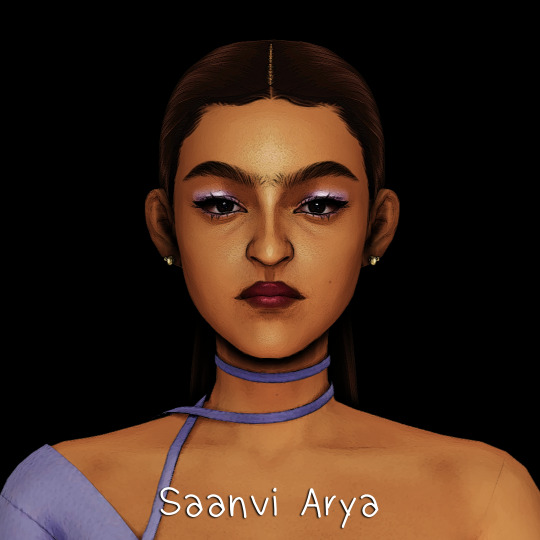
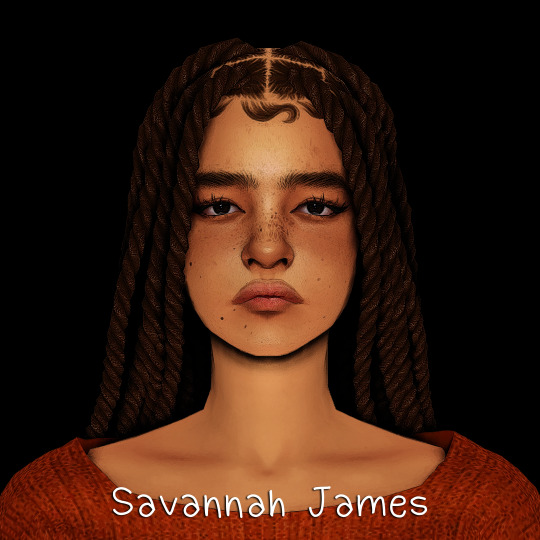
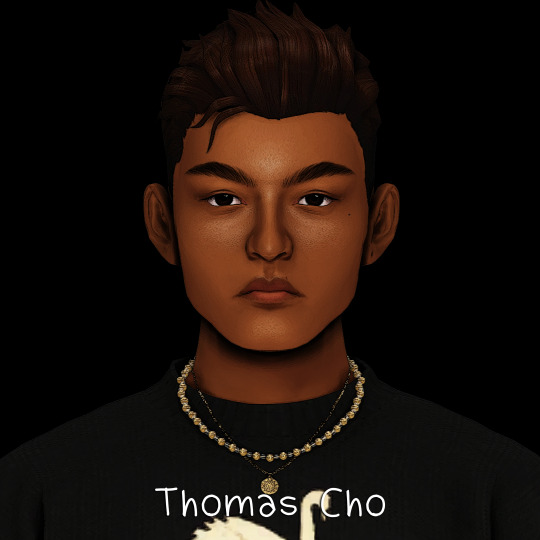
simulani's sim dump #1
a gift to all of my fellow simmers :D each sim comes with an everyday fit, all of their cc and tray files are included also! feel free to tag me! ♡
download them here
265 notes
·
View notes
Text
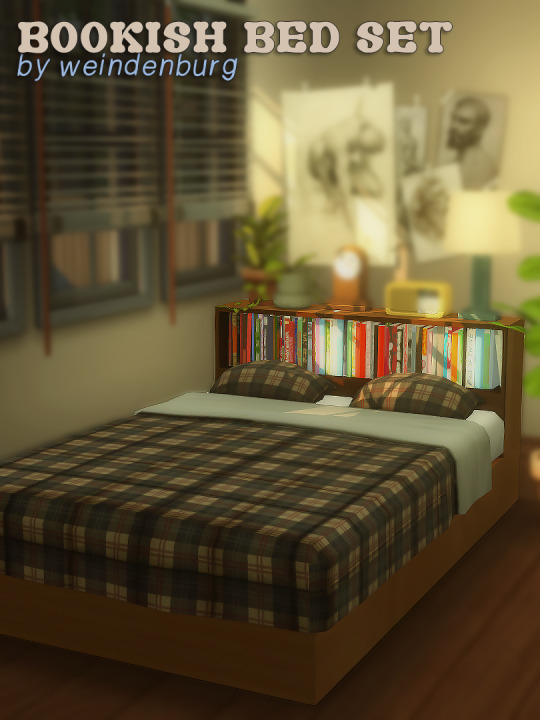
bookish bed set
a bed set for your bookish sims. flannel is to bookworms what pen is to paper. idk how to explain it. more info + download below!

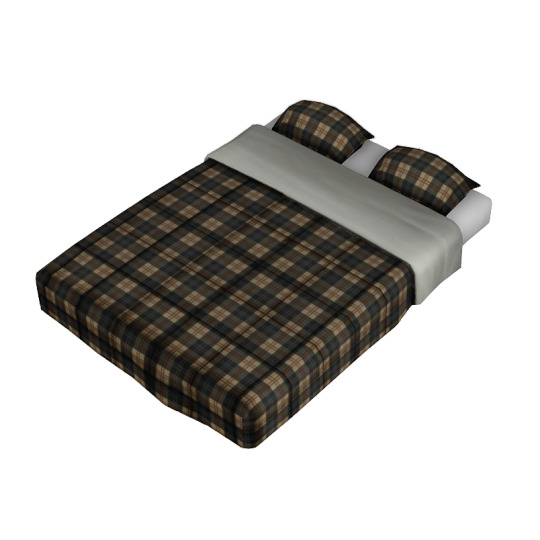

info;
bed frame: new mesh, bgc
mattress: recolor of lottie mattress by @myshunosun (mesh needed)
15 wood swatches using this wood palette by @silverhammersims and 15 plaid swatches from this palette by @madameriasims4
more details under the cut
download: patreon (always free) alt: sfs
known issues: you kind of have to alt place it because idk how to make it snap to the corners of the walls perfectly. I do this with every furniture piece anyway regardless of snapping but yeah, moveobjects on is highly recommended!
details:
I once again exceeded the slot limit so there’s a lot. ea should hire me to do this. you can even place large plants or large clutter!
I removed the object footprint on the bed frame so you can use any and all mattresses on it!
I shaped and scaled it in a way that even overhanging blankets won’t clip to the sides yay
update:
04/27/2024 - you now need to download the original mattress mesh from myshunosun's lottie bedroom set to fix the "missing object footprint resource" issue
@alwaysfreecc @public-ccfinds @mmfinds
2K notes
·
View notes
Text

70k sim dump - part 2 ✧˖*°࿐
more sims yay!! also my reshade preset is coming this weekend, i just filmed a video so i need to get that edited and we are good <3
do not claim these sims as your own. but if you use them, i'd love to see so please tag me!
-> DOWNLOAD THEM HERE ✧
1K notes
·
View notes
Text
TS4 - Cvntry LookBook
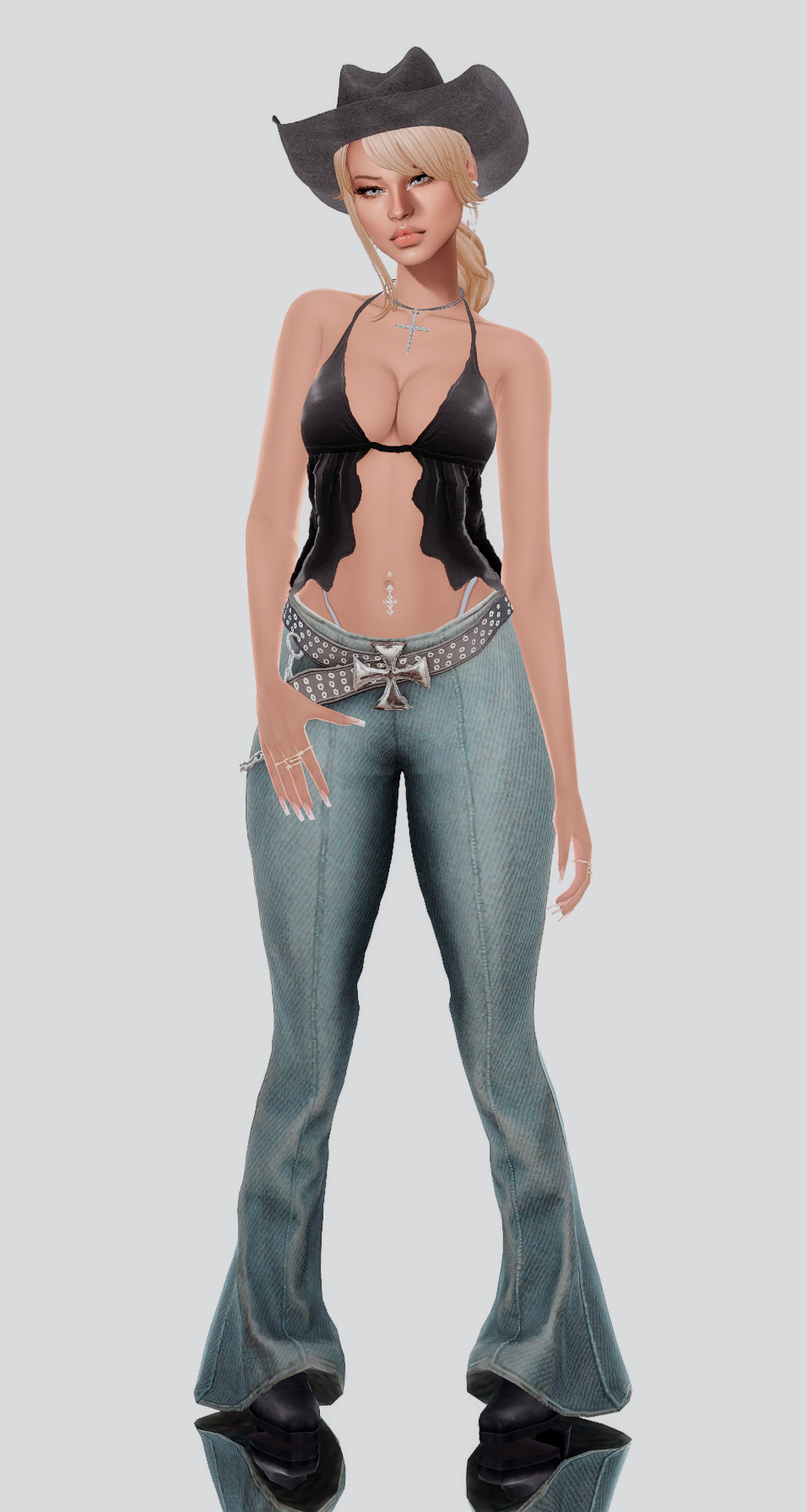
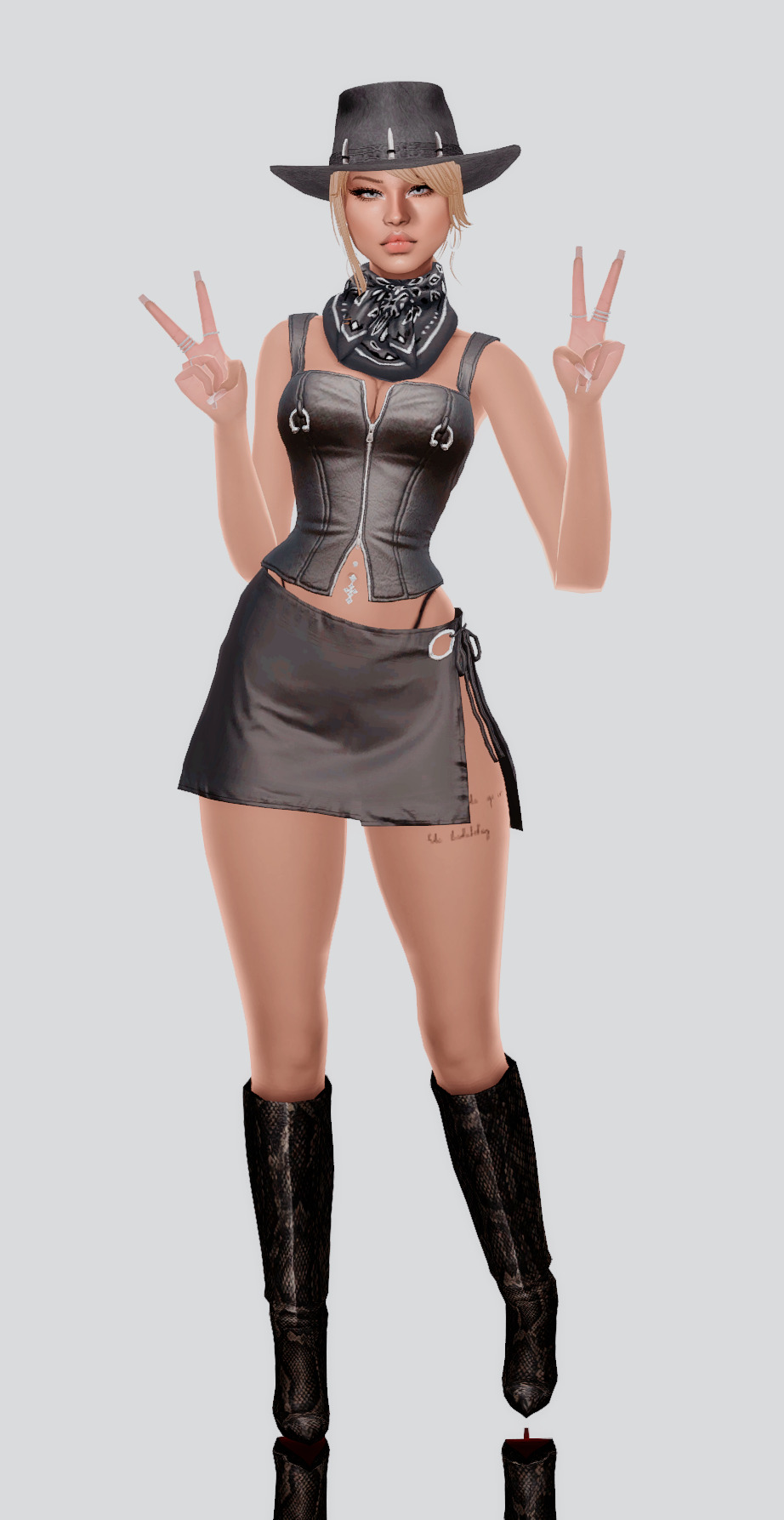
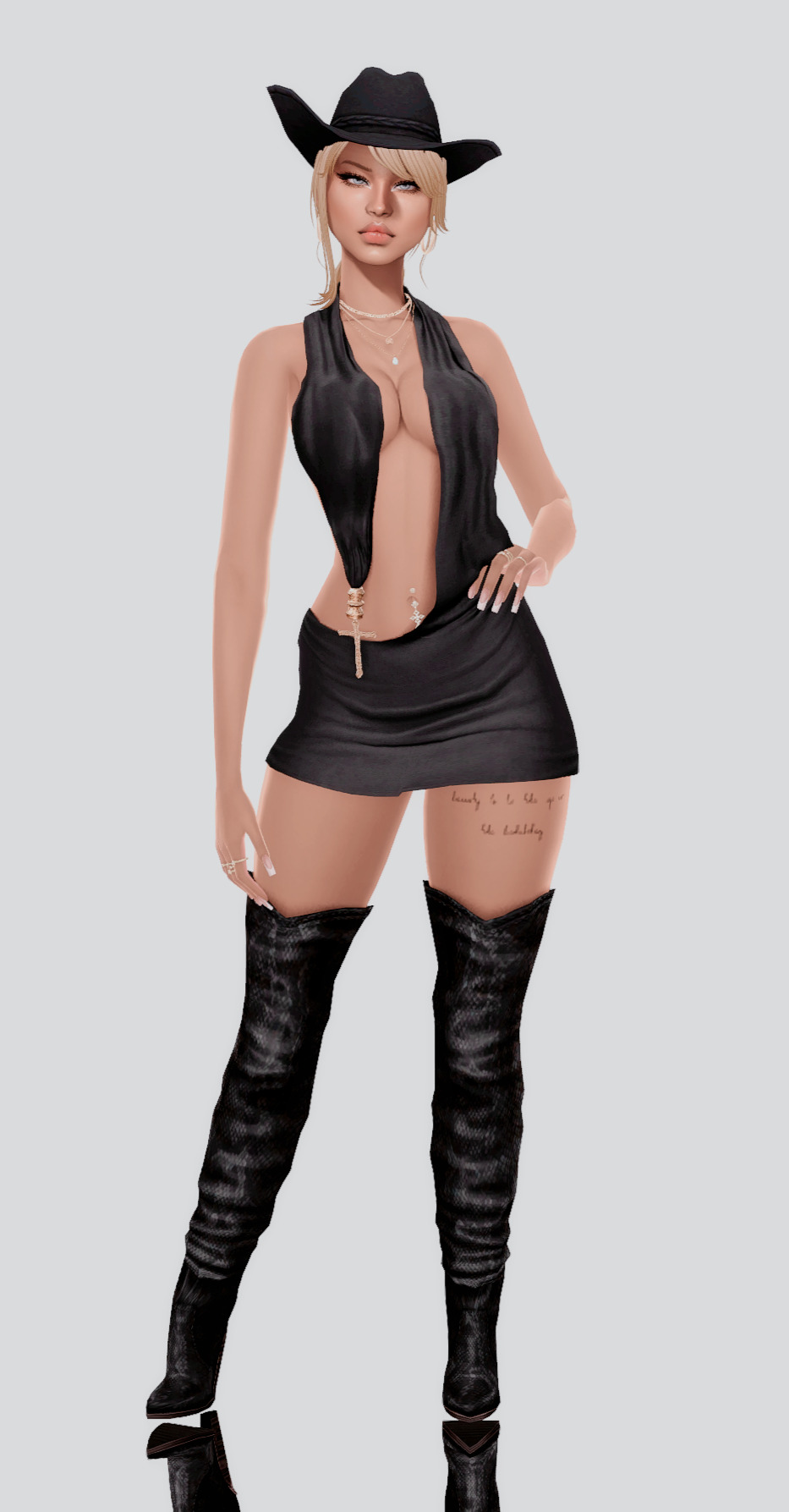
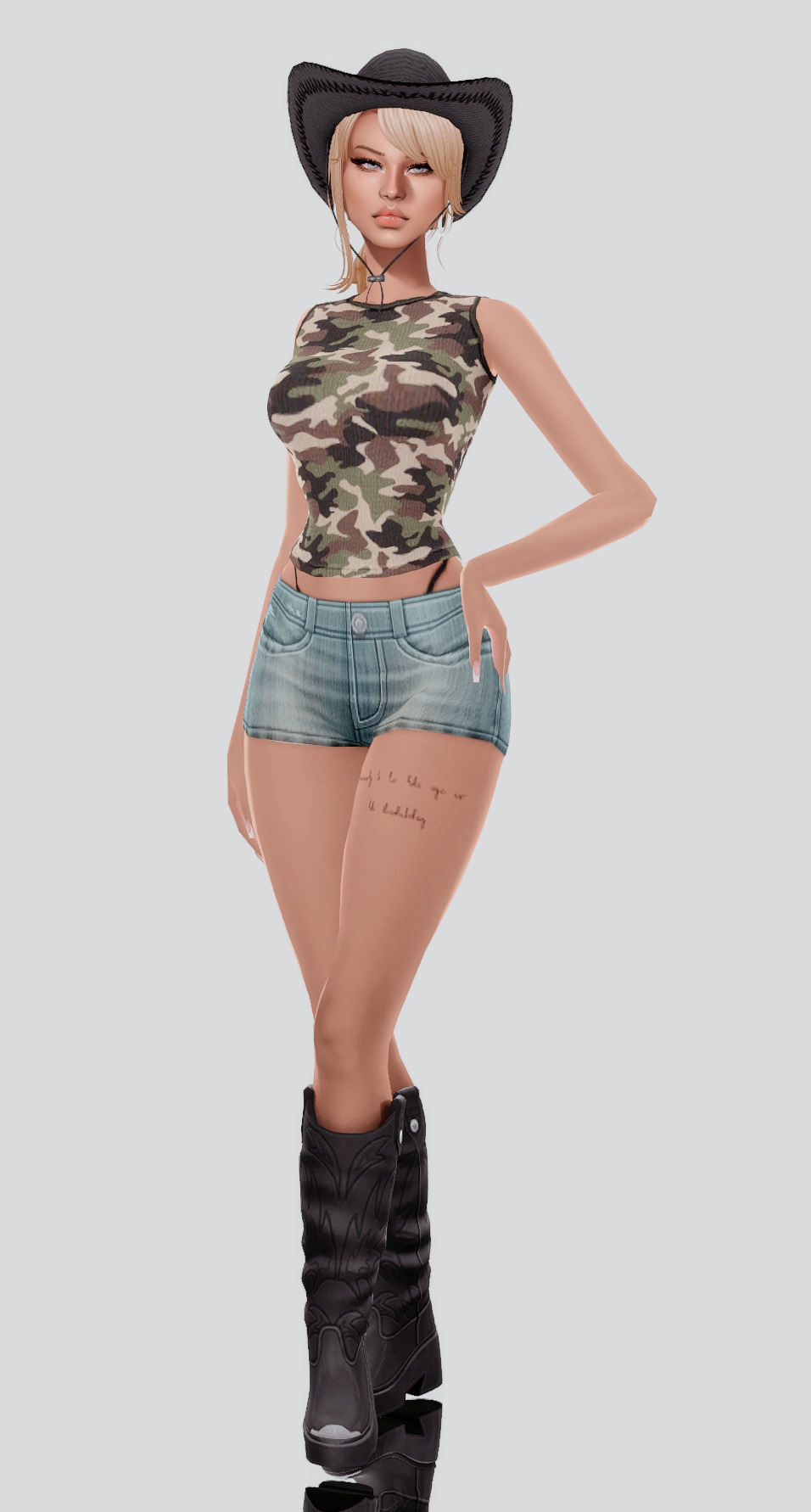
1 - | Hat | Necklace | Top | Jeans | Shoes | 2 - | Hat | *Scarf (HR)* | Top | Skirt | Boots | 3 - | Hat | Necklace | Dress | Boots | 4 - | Hat | Top | Shorts | Boots |
misc. CC used | Rings | Tattoo | Hair | Nails | Belly Ring | 🤠🤠🤠
thank you to the phenomenal cc creators! | @sentate | @belaloallure3 | @serenity-cc | @madlensims | @wisteriasims | @mermaladesims | @dogsill | @christopher067 | @arethabee | @b0t0xbrat | @pinkishwrld | @joshseoh |
creators not on tumblr | @/NataliS | @/Lexel_S | @/Lvndrcc | @/san33 |
1K notes
·
View notes
Text





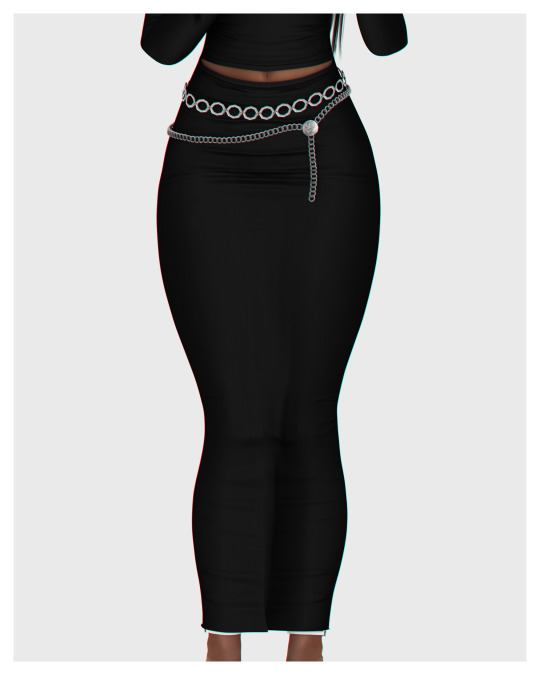





💅 Nailah Set 💅
Nailah Tight Long Sleeves Tee
12 swatches
Normal/Shadow Maps
HQ compatible
All lods
Nailah Low Rise Skirt
12 swatches
Normal/Shadow Maps
HQ compatible
All lods
May clip with some poses!
Nailah Chain Belt ACC
08 swatches
Wrist Category
Spec Map
HQ compatible
All lods
DOWNLOAD ( EARLY ACCESS )
- Public April/17
INSTAGRAM | PATREON (READ MY T.O.U BEFORE DOWNLOADING MY CC)
Support me on Patreon to get early access to my cc: patreon.com/backtrackcc ✨
2K notes
·
View notes
Text
[poppourri] Noemi Sim Download

Mabuhay simmers! Noemi is a playable character with all her outfits, traits, and aspirations; use her for whatever you’d like, but don’t claim my creations as yours. Follow me on Instagram @poppourri_ts4
DOWNLOAD
Download her CC; without it, she will merely be missing out on that stuff and not appear precisely the same. Please DM me if you experience any issues :) Lookbook inspiration by @bibidsims
Thank you to all cc creators!
@northernsiberiawinds @FKA @serenity-cc @twistedcat @goppolsme @thepeachyfaerie @mochizencc @crypticsim @nsves @busra-tr @miikocc @luumia
37 notes
·
View notes











